 There is nothing harder than taking criticism. Having to sit back and read or hear someone else tear your hard work apart is not easy—for anyone. As writers, we are bombarded with criticism constantly. Our work is reviewed by complete strangers and posted publicly. Editors and book coaches tell us all the things we got wrong in our writing—grammatically, structurally, and in our craft. How do we handle this?
There is nothing harder than taking criticism. Having to sit back and read or hear someone else tear your hard work apart is not easy—for anyone. As writers, we are bombarded with criticism constantly. Our work is reviewed by complete strangers and posted publicly. Editors and book coaches tell us all the things we got wrong in our writing—grammatically, structurally, and in our craft. How do we handle this?
Sadly, it’s very easy to do so badly.
We want to lash out and defend ourselves, but you can’t respond to bad reviews on Amazon or wherever– that looks bad to other potential readers. We want to write back to our editors and coaches and tell them that they’re flat out wrong, or they didn’t get it, or it’s just our personal writing style and they have to deal with it.
But is that the right thing to do?
Of course, sitting back away from a real situation we can say, no, of course not! Of course, we all know that we should take bad reviews with a grain of salt and an editor’s criticisms as constructive—they’re trying to help, right?
But when it happens, in the moment, wow, does that hurt!
So what do we do? We can rant and rail on Facebook to other writers. They understand, they’ve gotten bad reviews too. Every author has. Their support makes us feel better. Their commiseration works as a balm to our wounded egos.
You can’t really do that with an editor or coach. You can fire them and say that they don’t know what they’re doing or don’t understand your creativity (this happened to me recently), but are you really doing yourself a service there? If you are going to ignore your editor’s comments and criticism, why hire them in the first place? The point of hiring an editor or coach is to learn how to improve your work. If you dismiss their criticism you’re not learning.
Yes, criticism hurts. As I write this, I am still stinging from the harsh criticism my client heaped upon my attempts to tell him how to make his book better. It makes me question whether I should be a book coach or an editor at all, but I can’t let one person’s criticism affect my entire career. I’m telling myself this, I’m telling you this.
If you get harsh criticism take it as a learning opportunity. Try to figure out where you went wrong and do better next time. I know now that when I write a manuscript analysis letter to not include everything I found that was wrong. I should focus more on positive things than the negative because we only read and hear the negative—too much negative and we don’t hear what we did well, we are simply overwhelmed with all that we have to fix. I have learned to temper my criticism.
You, my dear readers, should you ever consider hiring me to coach you, will now have a better experience. All of my coaching clients will—current and future. But that’s the point—I’m not going to give up being a coach because I received some harsh criticism. I’m going to accept it and move on, incorporating what I’ve learned into my daily work.
The very first thing every author must learn is to have a thick skin when it comes to criticism. It’s true of editors and book coaches too. Accept the criticism, learn from it, move on.

It can be really difficult to receive and to deliver tough feedback. As an editor, I learned early on about “the feedback sandwich” (aka “the praise sandwich”). When you have to deliver feedback to a writer, it helps to first point out at least one thing (preferably several) that’s already working well in the manuscript. Then you point out the areas that need improvement, and then you close with something else positive and encouraging about the manuscript.
Including praise along with the areas that need improvement helps the writer feel like you’re like a partner/cheerleader instead of a critic, and that makes it easier for the writer to absorb what you have to say because they know you’re aware of the good and the bad in the manuscript and thus have given a fair assessment of it.
I’m glad you’re hanging in there and are giving it another go! 🙂
Thanks so much, Dana! I tried to do that–start and end with something positive. My client was still over overwhelmed with the negative in between, which was really the meat of what I had to tell him. We talked it over and concluded our relationship on good terms, I’m happy to say, and it was a good learning experience for both of us.